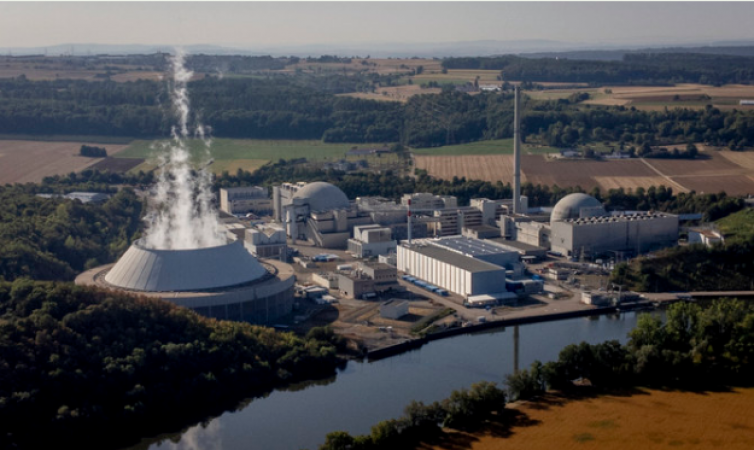
Berlin: On Saturday, Germany shut down its final three nuclear reactors, abandoning atomic power in the process of transitioning away from fossil fuels and dealing with an energy crisis brought on by the conflict in Ukraine.
Germany put an early end to its nuclear era while many Western nations increased their investments in nuclear energy to cut back on emissions.
It's "the end of an era," the RWE energy company declared in a statement shortly after midnight, confirming that the three reactors had been cut off from the power grid.
Since 2002, the largest economy in Europe has sought to phase out nuclear energy, but former chancellor Angela Merkel accelerated the process in 2011 following the Fukushima nuclear disaster in Japan.
Also Read: 'Don't watch pornographic videos in train', Railway advises passengers
The decision to leave was well received in a nation where there was a strong anti-nuclear movement, stoked by lingering concerns over a Cold War conflict and nuclear disasters like Chernobyl in the Ukraine.
"The risks of nuclear power are ultimately unmanageable," declared Environment Minister Steffi Lemke, who this week visited the tragic Japanese plant in preparation for the G7 summit there.
In several German cities, anti-nuclear protesters took to the streets to mark the closures. The anti-nuclear movement's driving force, Greenpeace, hosted a celebration at Berlin's Brandenburg Gate. A risky, wasteful, and expensive technology is coming to an end, according to Green MP Juergen Trittin.
Activists killed a model dinosaur in front of the Brandenburg Gate as a political statement.
Germany's nuclear exit was originally scheduled for the end of 2022, but it was postponed as Russian gas supplies were running low.
In order to fill any potential gaps left by gas, Germany, the EU's largest emitter, also turned on some of its idled coal-fueled plants.
Demands for a postponement of the nuclear phase-out have grown domestically as a result of the difficult energy situation.
In light of potential shortages and high prices, Germany had to "expand the supply of energy and not restrict it any further," according to Peter Adrian, president of the German Chamber of Commerce.
The abandonment of nuclear power, according to Friedrich Merz, head of the opposition CDU party, was brought on by a "almost fanatical bias."
The conservative daily FAZ, meanwhile, titled its Saturday edition "Thanks, nuclear energy," while outlining the advantages it claimed nuclear energy had brought the nation over time.
Greta Thunberg, a climate activist, criticised the decision in October and called it "a mistake." Other observers have expressed similar annoyance over Germany's insistence on abandoning nuclear power while increasing its coal use.
As anticipated, before midnight, the electricity network was cut off to the Emsland facility in the northwest, the Neckarwestheim facility in the southwest, and the Isar 2 reactor in the southeast of the nation.
According to Guido Knott, CEO of Preussen Electra, which runs Iser 2, the shutdown of the reactor will be "a very touching moment". Only 6% of Germany's energy in 2016 came from the remaining three plants, compared to 30.8% from all nuclear plants in 1997.
Economy Minister Robert Habeck rejected the notion of an extension and said before scheduled decommissioning the Funke group would begin dismantling the reactors "sooner or later".
Habček announced that the government had the energy situation "under control", adding that gas reserves had topped out and allowing imports of liquefied natural gas to fill the gap left by Russian supplies. The infrastructure was put in place.
The minister is instead working to have Germany produce 80% of its energy from renewable sources by 2030. Chancellor Olaf Scholz has requested the installation of "four to five wind turbines a day" over the following few years in order to achieve this goal; however, only 551 wind turbines were actually installed in 2017.
Also Read: The 2024 Cayenne has been hinted at by Porsche for international markets
However, the current pace of advancement in renewable energy may be too slow for Germany to achieve its climate protection objectives. Germany has not "pushed ahead enough with the expansion of renewables in the last 10 years," according to Simon Mueller of the Agora Energiewende think tank, despite plans to abandon nuclear power.
Mueller claims that Germany must now "pull out all the stops" in order to build enough onshore wind capacity.